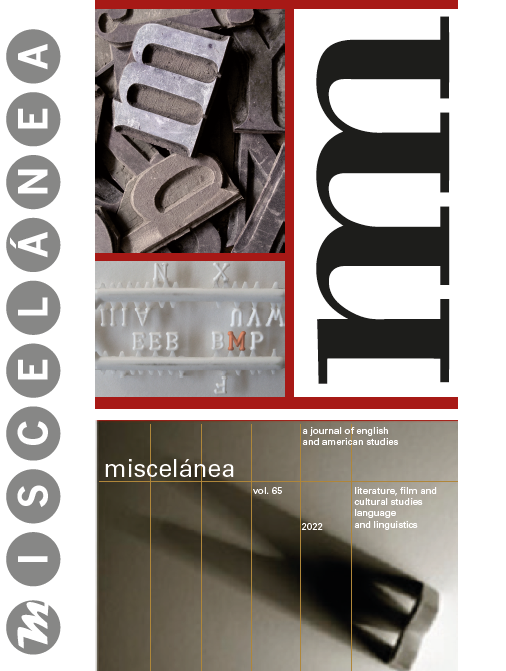Madres monstruposas y chicas muertas en Monstruous Mothers y Gone Girl, de Gillian Flynn
DOI:
https://doi.org/10.26754/ojs_misc/mj.20226853Palabras clave:
Gillian Flynn, monstruosidad, maternidad, criminalidad femenina, trauma, Gone Girl, Sharp ObjectsResumen
Este artículo explora dos imágenes predominantes de los personajes femeninos de Gillian Flynn: la madre monstruosa y la niña desaparecida/muerta. Estas dos representaciones de los personajes femeninos de Flynn muestran el vínculo entre la criminalidad y la transgresión femeninas, por un lado, y la historia traumática y la disfuncionalidad familiar de los personajes femeninos, por otro. Este artículo sostiene que el uso que hace Flynn de estos dos tropos revela las facetas conflictivas de la delincuencia femenina, el victimismo y la agencia en sus thrillers, y al hacerlo su obra subvierte el turbio ámbito de la representación de las mujeres delincuentes en relación con la maternidad, la enfermedad mental y el trauma.
Descargas
Referencias
Bolin, Alice. 2018. Dead Girls: Essays on Surviving an American Obsession. New York: Harper Collins.
Braidotti, Rosi. 1997. “Mothers, Monsters, and Machines” In Conboy, Katie, Nadia Medina and Sarah Stanbury (eds.) Writing on the Body: Female Embodiment and Feminist Theory. New York: Columbia University Press: 59-79.
Bronfen, Elisabeth. 2017. Over Her Dead Body: Death, Femininity and the Aesthetic. Manchester: Manchester University Press.
Burke, Eva. 2018. “From Cool Girl to Dead Girl: Gone Girl and the Allure of Female Victimhood”. In Joyce, Laura and Henry Sutton, (eds.) Domestic Noir. Palgrave Macmillan: 71-86.
Connell, R. W. 1987. Gender and Power: Society, the Person and Sexual Politics. Cambridge: Polity.
Creed, Barbara.1993. The Monstrous-Feminine: Film, Feminism, Psychoanalysis. London: Routledge.
Douglas, Susan and Meredith Michaels. 2004. The Mommy Myth: The Idealization of Motherhood and How It Has Undermined Women. New York: Simon and Schuster.
Felman, Shoshana 1993. What Does a Woman Want?: Reading and Sexual Difference. Baltimore: Johns Hopkins University Press.
Flynn, Gillian. 2012. Gone Girl: A Novel. Broadways Books.
Flynn, Gillian. 2006. Sharp Objects. Broadways Books.
Gavin, Adrienne E. 2010. “Feminist Crime Fiction and Female Sleuths.” In Rzepka, Charles J. and Lee Horsley (eds.) A Companion to Crime Fiction. Oxford: Wiley-Blackwell: 258-269.
Glenn, Evelyn Nakano. 1994. “Social Constructions of Mothering: A Thematic Overview”. In Glenn, Evelyn Nakano, Grace Chang, and Linda Rennie Forcey (eds.) Mothering: Ideology, Experience, and Agency. New York: Routledge: 1-29.
Irons, Glenwood (ed.) 1995. Feminism in Women's Detective Fiction. Toronto: University of Toronto Press.
Ladd-Taylor, Molly, and Lauri Umansky (eds.) 1998. “Bad” Mothers: The Politics of Blame in Twentieth-Century America. NYU Press.
McMahon, M. 1995. Engendering Motherhood: Identity and Self-Transformation in Women's Lives. New York: Guilford Press.
Miller, Alyson. 2019. “‘Emissaries of Death and Destruction’: Reading the Child-as-Killer in We Need to Talk about Kevin and Sharp Objects.” Critique: Studies in Contemporary Fiction 60 (4): 1-14.
Munt, Sally Rowena. 1994. Murder by the Book? Feminism and the Crime Novel. London: Routledge.
Schippers, Mimi. 2007. “Recovering the Feminine Other: Masculinity, Femininity, and Gender Hegemony”. Theory and Society 3 (1): 85-102.
Scull, Andrew. 2016. Madness in Civilization. London: Thames and Hudson.
Seltzer, Mark. 1998. Serial Killers: Death and Life in America’s Wound Culture. New York Routledge.
Thornham, Sue. 2015. “‘A Hatred so Intense…’ We Need to Talk about Kevin, Postfeminism and Women’s Cinema”. Revista Lusófona de Estudos Culturais, 3 (1): 43-63
Descargas
Publicado
Número
Sección
Licencia
Derechos de autor 2022 Miscelánea: A Journal of English and American Studies

Esta obra está bajo una licencia internacional Creative Commons Atribución-NoComercial 4.0.


